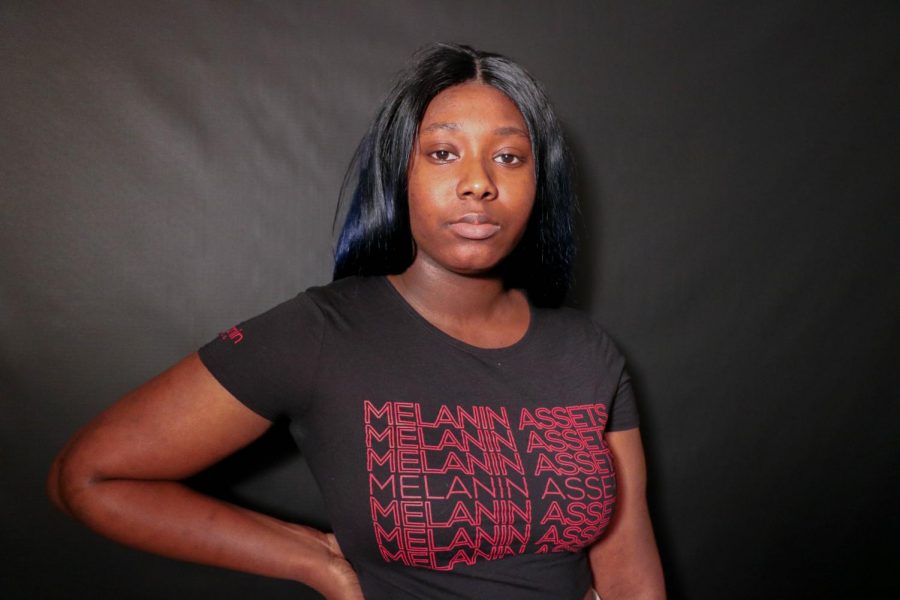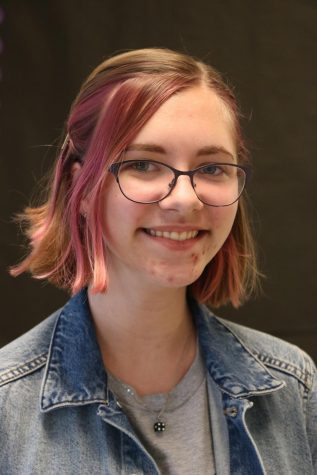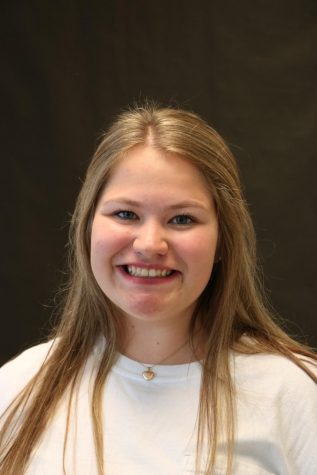Listen and learn
After former BVNW graduate and Dazzler Camille Sturdivant sued the school district alleging her civil rights were violated, black BVNW students ask others to acknowledge, and seek solutions to racism.
Senior Aissata Haidara poses in a shirt that says “MELANIN ASSETS” (Jan. 18). “Racism happens all the time, it happens to me, it happens to everyone of a different race.”
February 5, 2019
Former Dazzler and 2018 graduate Camille Sturdivant is suing the Blue Valley School District, principal Amy Pressly, former Dazzler coach Carley Fine and district elementary teacher and Dazzler mother Katie Porter, stating her civil rights were violated during her time on the BVNW dance team. BVNW administration and district officials declined to comment on the issue due to the pending litigation. (For further information about the lawsuit, see BVNWnews.com)
—————————————————————————————————————-
Working ten times harder than other BVNW students to discredit the stereotypes of her black heritage, senior Nachel Sawyer said that in a school of close to 75 percent white students, people at Blue Valley Northwest have preconceived stereotypes about her, based on her race, before they ever get to know her.
Sawyer said when she was in her English class as a junior, her fellow students were unwilling to listen and learn about the black experience.
“When we talked about the black race there was so much ignorance going around in the conversation,” Sawyer said. “Even though we were talking about it and learning about it, nobody was listening and learning anything.”
In an effort to get her fellow students to listen to the idea that everyone matters, Sawyer wrote and performed a poem titled “Mixtape Deluxe,” at the Diversity Assembly last year. While she received a standing ovation after her performance, she said she worried about whether the audience understood her purpose.
“Of course I felt happy because I got a standing ovation. That’s amazing, but I want people to hear me,” Sawyer said. “They need to listen.”
Sawyer also said not only do people need to listen, they need to understand the extent of discrimination in today’s society.
Looking back at what she said was one of the worst days of her life, senior Aissata Haidara recalled an experience she had with racism at Northwest during Spirit Week of her sophomore year. Haidara and a friend were talking about what to dress as for the day “Blast to the Past,” which encouraged students to dress like their younger selves.
“We were just talking, and I was like, ‘If I dressed the way that I did as a child, I would look like a total outcast,’” Haidara said. “This girl out of nowhere comes up into the conversation and goes, ‘Well you already are an outcast because you’re black.’”
Haidara was born in New York City, but lived in the western African country of Guinea for nine years of her childhood. She said she has witnessed prejudice based on skin color in both Africa and the U.S. In Guinea, she said there are who people prefer those with lighter skin, which is called colorism.
Though there is racism in Africa and in the U.S., Haidara said there is a greater sense of community in Africa, whereas in America, people keep to themselves. The more reserved nature of American society has caused her to be less open than she used to be, and she said it has affected how she makes friends. While her connections with her black friends extend beyond skin color, she said that the commonality of their race was what pushed her to first initiate relationships with them.
“The main reason why I pushed forward and went and started a conversation with [her black friends] is because I felt like we had one thing in common: that is our race,” Haidara said.
Similar to Sawyer’s experiences, Haidara also said her race influences the way she is perceived at Northwest.
While junior Ayomide Ejelonu said he experiences racist comments and jokes frequently while living in Overland Park, his response is to not take those remarks too seriously.
“I hear racist jokes all the time and all racist stuff, but I never really take it seriously,” Ejelonu said. “At the end of the day, they’re just ignorant. They just don’t know.”
Ejelonu moved to the U.S. from Nigeria when he was four years old, and said he felt different for being the only black student in his all-white kindergarten class at a private school.
Being at Northwest, he said combatting racism will take time as things like Sawyer’s poem or Diversity Week can promote progressive ideas, but more steps will have to be taken in order to enact true change.
“It was great to [reach] people, but I feel like maybe people forgot about it and didn’t really think about it because the next day people act the exact same,” Ejelonu said. “Diversity week is one thing, one day. I feel like the speech is really good, but I feel like we need more than just a speech one day at a time.”
While she said many students consider the Diversity Assembly to be the most fun school assembly of the year, senior and Diversity Council member Mary Kiani Nia said that she hopes students leave the assembly with a more open mind.
“I hope that they take something from it and learn to accept people who are different from them, especially with all the things that are going on with the school currently,” Kiani Nia said.
To try and promote more discussions about uncomfortable topics such as race, English teacher Kimberly Hillstock said she allows students to talk about controversial ideas in her Contemporary Communications classes for BVNW seniors. During discussions, she said she often repeats to students that they must be open to others’ ideas.
“You have to acknowledge that there are other opinions out there,” Hillstock said. “That doesn’t mean you accept those opinions. Acknowledging someone’s opinion is the first step.”
Rebecca Davis, an associate teaching professor of history at UMKC, said that due to events such as white flight in the twentieth century, there are lasting divisions between the Johnson County suburbs and downtown Kansas City.
“There is a perception, especially on this side of the [state] line, that Johnson County is where the racist white people live,” Davis said.
While many white people deny their privilege because of the hard work they put in to achieve their goals, Davis said the idea of privilege should not be about guilt, but about progress. She said the betterment of society can be achieved if those who have privilege, whether due to race or other factors, use their position to assist those who are marginalized.
“It’s about understanding how you can use that privilege to help somebody else,” Davis said.
Tyler Johnson and Emily Mahapatra, 2014 BVNW alumni, created an online petition after news of the lawsuit broke on BVNWnews’ Twitter Jan. 14. The petition calls for diversity and inclusion training for staff members and intervention in student behavior. When she and Johnson were in high school, Mahapatra said they were not alarmed by certain behaviors they now consider troubling.
“We went on to learn a lot more about these types of things. And that’s when you look back retroactively and it’s almost alarming how many things you noticed that happened in high school that are just absolutely unacceptable,” Mahapatra said.
Because Johnson has encountered people who claim that black people are exaggerating their accusations of racism, he said he and Mahapatra intend to show their solidarity with Sturdivant through the petition.
“One of my central goals to writing this was to say she’s not being overdramatic,” Johnson said. “We can also attest to this being an active problem.”
Northwest parent and Parent Booster Club president Jeanna Repass said racism is still real, due to people’s biases and prejudices.
“Because the one thing you can’t change is the color of your skin, I can see people with love and respect and treat them the way I want to be treated,” Repass said. “But I can’t change how they’re going to look at me because my skin is this beautiful, deep mahogany.”
Since she said she has mostly seen reporting on one side of the story, Repass said she hopes everyone approaches both the Sturdivants and the school district with an open mind.
“It’s really, really tough for someone to come forward, it’s also really, really tough for someone to make that kind of accusation,” Repass said. “So I think that if we all just have some empathy, all around, we’ll be able to get through it.”





